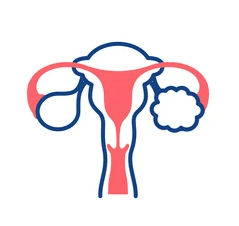What Causes It?
Insulin resistance - Up to 70% of women with PCOS have insulin resistance, meaning that their cells can't use insulin properly. The body may produce higher than normal amounts of insulin to compensate, which can lead to higher androgen production, causing difficulty with ovulation.
Hormonal imbalance - Many women with PCOS have higher than normal levels of androgens (male hormones), which can prevent the ovaries from releasing an egg during the menstrual cycle and can cause extra hair growth and acne.
Low-grade inflammation - Research has shown that women with PCOS have low-grade inflammation, which can stimulate the ovaries to produce androgens.
Genetics - PCOS tends to run in families, suggesting there may be a genetic link. Several genes have been associated with PCOS.
Environmental factors - Exposure to certain environmental factors during prenatal development or early life may increase the risk of developing PCOS.
Obesity - While not all women with PCOS are overweight, obesity can worsen the symptoms of PCOS. Excess weight can increase insulin resistance and inflammation, both of which contribute to PCOS.
Abnormal fetal development - Some research suggests that exposure to high levels of androgens during fetal development may lead to PCOS later in life.
Autoimmune responses - Some evidence suggests that PCOS may be associated with autoimmune conditions, where the immune system attacks the body's own tissues.
Hypothalamic-pituitary dysfunction - Abnormalities in the hypothalamus or pituitary gland, which control the release of hormones involved in the menstrual cycle, may contribute to PCOS.
Endocrine disruptors - Certain environmental chemicals that interfere with hormone function, known as endocrine disruptors, have been proposed as potential contributors to PCOS.
Signs & Symptoms
Irregular periods - Infrequent, irregular or prolonged menstrual cycles are the most common sign of PCOS. For example, you might have fewer than nine periods a year, more than 35 days between periods and abnormally heavy periods.
Excess androgen - Elevated levels of male hormones may result in physical signs, such as excess facial and body hair (hirsutism), severe acne and male-pattern baldness.
Polycystic ovaries - Your ovaries might be enlarged and contain follicles that surround the eggs. As a result, the ovaries might fail to function regularly.
Weight gain - Many women with PCOS struggle with weight gain or difficulty losing weight, particularly around the abdomen.
Skin darkening - Dark patches of skin may develop in body creases, such as those on the neck, in the groin, and under the breasts.
Skin tags - Small pieces of excess skin may develop, usually in the armpits or neck area.
Infertility - Due to irregular ovulation or failure to ovulate, PCOS is one of the most common causes of infertility in women.
Mood disorders - Women with PCOS have a higher incidence of depression, anxiety, and eating disorders.
Sleep apnea - This serious sleep disorder, where breathing repeatedly stops and starts during sleep, is more common in women with PCOS, especially if they're overweight.
Headaches - Some women with PCOS report more frequent or severe headaches, possibly due to hormonal fluctuations.
